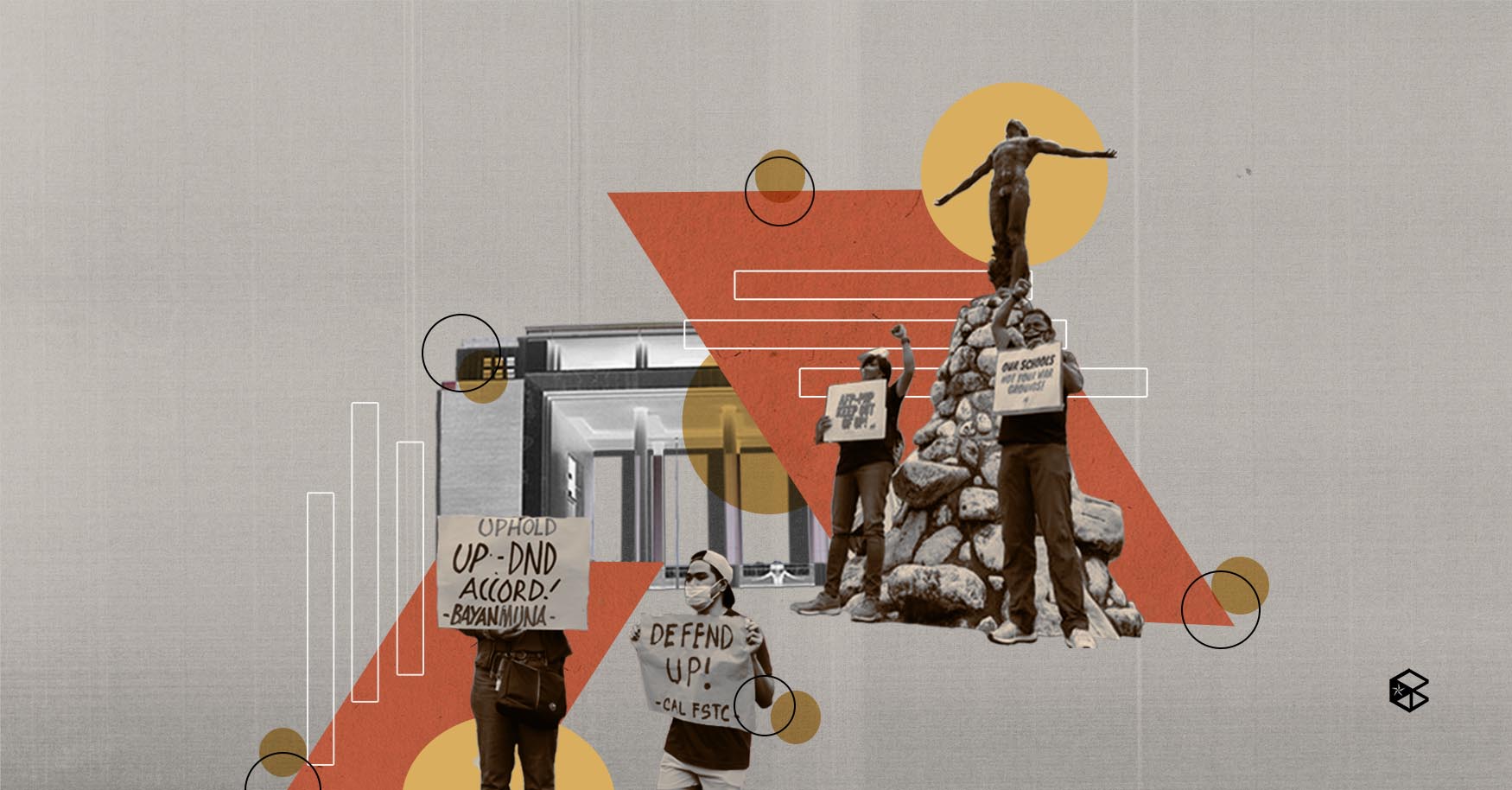Through the Department of National Defense (DND), the Duterte administration put an end to the forged 1989 University of the Philippines (UP)-DND Accord, an agreement that bans the entry of state forces in the university’s premises without prior notice.
The accord, signed on June 30, 1989, averted the military from entering UP campuses and servicing search or arrest warrants on any UP student, faculty, or employee without notifying the administration of the university except in "cases of hot pursuit and similar occasions of emergency." Thus, if the scrapped accord is executed, police and military officers can step in the UP campuses grounds freely. Moreover, any arrests or detentions are not required to be reported immediately to the school administration, posing a risk to youth activism.
The administration’s roots and reason for termination
Though it was made public on the night of January 18, Defense Secretary Delfin Lorenzana already officially notified UP President Danilo Concepcion about the abrogation on January 15, with the justification rooted on cited “reports'' of Communist Party of the Philippines and the New People's Army’s (CPP-NPA) in-campus recruitment activities. However, Concepcion denied the allegations, emphasizing that UP does not tolerate armed insurrection, sedition, the use of force for political motives.
However, the defense chief further stated that the accord was a "hindrance in providing effective security, safety, and welfare of the students, faculty, and employees of UP," which led to his “own volition” of terminating the agreement, dissociating Duterte's involvement in the said termination. Concepcion’s reply last Jan. 19 ended with a call "to reconsider and revoke [DND's] abrogation," given that the decision was unilateral and not consulted before with UP stakeholders.
However, it is noted that prior to the termination, the Duterte administration declared and branded CPP-NPA as a terrorist organization, with UP as its recruitment ground, as it is the hotspot of activists and government critics.
In the name of legality and the say of politics
The abrogation has been denounced not just by students and the UP administration, but also other critics and lawmakers.
According to GMA’s in-house political analyst Mr. Richard Heydarian, the deal termination is an attack on the country’s “independent thinking and political conscience.”
Legal expert Mr. Tony La Viña mentioned that this act is "a part of the government’s long-standing crusade to silence anyone who is opposed to its views," further emphasizing that DND has "no right to unilaterally terminate the agreement" for it “did not provide for an exit clause.” Thus, both parties must agree to end this mutual pact in order to be legally valid.
He further added that the letter of notice to Concepion is focused on red-tagging students “who are fearlessly standing up for what they believe in” and has failed to provide “any overriding public interest to interfere with UP’s academic freedom.”
“It did not show any clear and present danger which can limit a student or a professor’s civil liberty,” La Viña said, citing the UP Charter and the 1987 Philippine Constitution.
UP Diliman law alumnus and Senator Kiko Pangilinan spoke about the issue and highlighted that "UP has always been and will always be a citadel of freedom and democracy."
Furthermore, in a statement released by VP Leni Robredo last Jan. 19, the abrogation’s message is in contrast to its intention, such that “under this administration, anyone, anywhere, at any time, is fair game."
“Clearly, then, this is not a practical gesture, but a symbolic one. One designed to sow fear. One designed to discourage dissent. One designed to silence criticism,” VP Robredo underscored.
More than what it meets the eye
Its question of controversy and significance goes beyond the reason of its creation and its repercussion to the students and country’s right to expression and academic freedom.
The accord was created after the 1989 abduction, force of confession for murder of American soldier Col. James Rowe, and the torture of UP’s Philippine Collegian student-journalist Donato Continente, to prevent the abusive incident from happening again. Furthermore, UP campuses have been the haven of national student activism since the 1980s, wherein a dark and long history of student killings, threats, disappearances, and police and military violence lies within.
In the time of pandemic where protest restrictions, dissent crackdowns, and antagonization of demonstrators by the government is adamant, the said reason for abrogation is skeptical as students are in their homes during the lockdown, contradicting the breeding ground argument. Moreover, the pact is one of the students’ main safeguards when joining peaceful protests; thus, removing it allows the military to interfere with the peaceful dissent of UP constituents, attacking both freedom of speech and academic freedom that has insinuations morally and legally.
“(It is stated in the 1987 Constitution that) academic freedom shall be enjoyed in all institutions of higher learning. (...) It is the essential basic mission of an academic institution that scholars have freedom to teach, communicate ideas and facts (...) without being targeted for repression, for imprisonment, or for job loss,” former UP Diliman National College of Public Administration and Governance Dean Edna Co stated in an interview with GMA News Online.
With the scrapping of the accord, the incumbent administration further diminishes the space for dissent that has been labeled by rights defenders as one of the liberties that is under siege amongst Duterte’s strongman rule.
The abrogation of the UP-DND accord is more than a personal-turned-political action. It is showing the power of the authority to control its constituents towards campus militarization, academic freedom, and the country’s fire towards activism, criticism, and dissent.
In this time where the Filipino’s freedom to expression and movement is threatened, it is more needed for the society to be rational, critical, and courageous and firm in standing one’s ground towards justice, fairness, and democracy.


